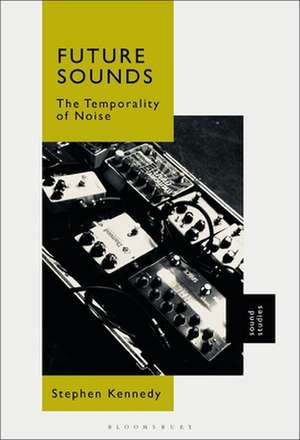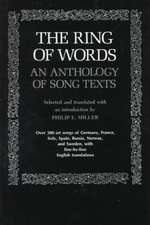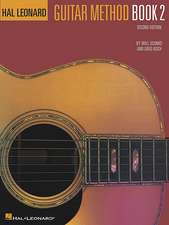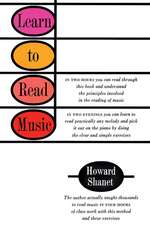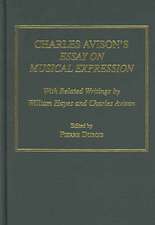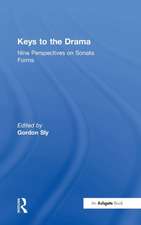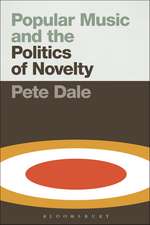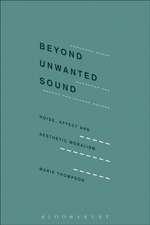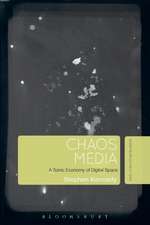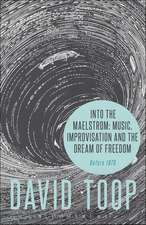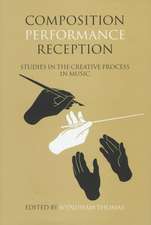Future Sounds: The Temporality of Noise
Autor Stephen Kennedyen Limba Engleză Paperback – 22 ian 2020
| Toate formatele și edițiile | Preț | Express |
|---|---|---|
| Paperback (1) | 222.19 lei 43-57 zile | |
| Bloomsbury Publishing – 22 ian 2020 | 222.19 lei 43-57 zile | |
| Hardback (1) | 654.77 lei 43-57 zile | |
| Bloomsbury Publishing – 25 iul 2018 | 654.77 lei 43-57 zile |
Preț: 222.19 lei
Preț vechi: 256.48 lei
-13% Nou
Puncte Express: 333
Preț estimativ în valută:
42.53€ • 46.21$ • 35.75£
42.53€ • 46.21$ • 35.75£
Carte tipărită la comandă
Livrare economică 21 aprilie-05 mai
Preluare comenzi: 021 569.72.76
Specificații
ISBN-13: 9781501361715
ISBN-10: 1501361716
Pagini: 176
Dimensiuni: 152 x 229 mm
Greutate: 0.25 kg
Editura: Bloomsbury Publishing
Colecția Bloomsbury Academic
Locul publicării:New York, United States
ISBN-10: 1501361716
Pagini: 176
Dimensiuni: 152 x 229 mm
Greutate: 0.25 kg
Editura: Bloomsbury Publishing
Colecția Bloomsbury Academic
Locul publicării:New York, United States
Caracteristici
Provides
new
insight
into
the
political
economy
of
prediction:
how
can
existing
models
of
political
economy
be
reconfigured
to
more
accurately
reflect
the
technological
nature
of
the
contemporary
age?
What
is
the
role
of
sound
in
this
task?
Notă biografică
Stephen Kennedy is Principal Lecturer in Media & Communication and Media Arts at University of Greenwich, UK. He is a critical theorist and political philosopher whose research ranges in scope from an analytic assessment of the figure of new technology in governmental policy to the circulation of cultural capital within mediated environments.
Cuprins
PrefaceIntroduction1.
Critical
Temporalities2.
Noise
and
Political
Economy3.
Remembering
the
Future:
1977
-
20174.
Continuous
Discontinuity:
A
Non-Linear
History
of
NoiseBibliographyIndex
Recenzii
As
his
book
unfolds,
Kennedy
shows
readers
the
intricate
political,
societal,
and
cultural
connections
between
the
constructs
of
time,
space,
and
sound.
This
thought-provoking,
brilliantly
written
book
will
resonate
for
generations
to
come.
Summing
Up:
Essential.
Upper-division
undergraduates
through
faculty.
For Kennedy, the algorithmic digital economy of our times is manufacturing a torrential complexity that necessitates a radical departure in our modes of critical thinking, a turn that seeks not simply to elevate the sonic to the status of the visual but, rather, to deploy a pansonic mode of engagement. The political project here is clear: we need to attend to this complexity rather than abdicate responsibility of its meanings to automated algorithmic selection, perceptual coding, cloaking technologies and noise filtering processes. We need not only to bring the noise but to turn it up. Think of this not as an analysis but rather a clarion call from the future anterior of music that demands that we listen in the full knowledge that we may well not yet know what to do in the face of the noise that we hear.
InFuture Soundswe inhabit noise as it constructs and ruptures time and space. Drawing on a wide range of authors including Bergson, Hainge and Sterne, Stephen Kennedy shows us how the undercurrent of noise drives us and washes us up on the shores of coalescing political and cultural epochs such as the digital, by way of Howard Devoto and Paul Klee.
Noise, clamour, chaos: InFuture SoundsKennedy has brilliantly shown how the non-linearity and multi-temporality of noise has been productive of so called digital culture. Key reading for anyone interested in the realities of the digital age and the most relevant philosophies of time and technology,Future Soundsgives us an entirely unique way to see how digital culture has been characterised by noise, rather than dialectics. Using examples from punk to electronic sounds to glam experimentalists to computer noise, Kennedy shows how music has been entangled in political economy. He argues insightfully that music, rather than acting as a herald of a possible shared future, is instead entirely mixed up in the clamour of the present. A key argument of this book has to do with media time, particularly concerning the type of temporality expressed by noise. Another key feature is Kennedy's argument that noise can be used as an analytical tool to begin to theorise the uncertainty of the digital. Kennedy shows how noise is a productive way to understand this discontinuity of digital time and how this can be used to think through modes of politically informed practice amongst a world where everything comes from everywhere, all at once.
For Kennedy, the algorithmic digital economy of our times is manufacturing a torrential complexity that necessitates a radical departure in our modes of critical thinking, a turn that seeks not simply to elevate the sonic to the status of the visual but, rather, to deploy a pansonic mode of engagement. The political project here is clear: we need to attend to this complexity rather than abdicate responsibility of its meanings to automated algorithmic selection, perceptual coding, cloaking technologies and noise filtering processes. We need not only to bring the noise but to turn it up. Think of this not as an analysis but rather a clarion call from the future anterior of music that demands that we listen in the full knowledge that we may well not yet know what to do in the face of the noise that we hear.
InFuture Soundswe inhabit noise as it constructs and ruptures time and space. Drawing on a wide range of authors including Bergson, Hainge and Sterne, Stephen Kennedy shows us how the undercurrent of noise drives us and washes us up on the shores of coalescing political and cultural epochs such as the digital, by way of Howard Devoto and Paul Klee.
Noise, clamour, chaos: InFuture SoundsKennedy has brilliantly shown how the non-linearity and multi-temporality of noise has been productive of so called digital culture. Key reading for anyone interested in the realities of the digital age and the most relevant philosophies of time and technology,Future Soundsgives us an entirely unique way to see how digital culture has been characterised by noise, rather than dialectics. Using examples from punk to electronic sounds to glam experimentalists to computer noise, Kennedy shows how music has been entangled in political economy. He argues insightfully that music, rather than acting as a herald of a possible shared future, is instead entirely mixed up in the clamour of the present. A key argument of this book has to do with media time, particularly concerning the type of temporality expressed by noise. Another key feature is Kennedy's argument that noise can be used as an analytical tool to begin to theorise the uncertainty of the digital. Kennedy shows how noise is a productive way to understand this discontinuity of digital time and how this can be used to think through modes of politically informed practice amongst a world where everything comes from everywhere, all at once.
